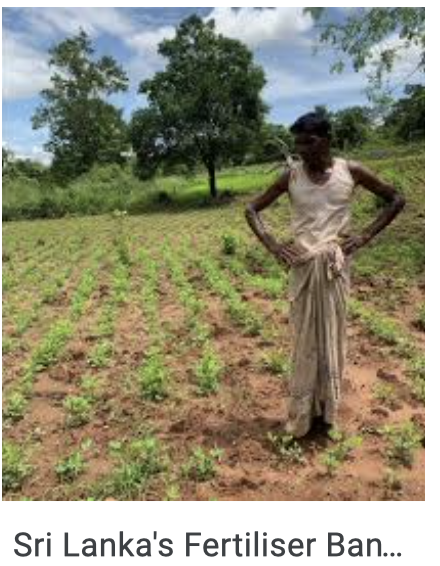It takes a combination of a Yale undergraduate education and a Harvard JD to produce someone this stupid, this ignorant
/You’re never going to get an idiot like Powers to actually go out to fly over country and listen — not talk, listen — to real farmers, but maybe she could at least look beyond her greengrocer’s EV delivery van and see whether there are any real-world experiments in nationwide organic farming. If she did, she might stumble across the example of a small island nation in the Indian Ocean that did exactly what she’s advocating now, to disastrous effect.
Of course, the peasants of Sri Lanka got their lesson from their betters, good and hard
Faced with a deepening economic and humanitarian crisis, Sri Lanka called off an ill-conceived national experiment in organic agriculture this winter. Sri Lankan President Gotabaya Rajapaksa promised in his 2019 election campaign to transition the country’s farmers to organic agriculture over a period of 10 years. Last April, Rajapaksa’s government made good on that promise, imposing a nationwide ban on the importation and use of synthetic fertilizers and pesticides and ordering the country’s 2 million farmers to go organic.
The result was brutal and swift. Against claims that organic methods can produce comparable yields to conventional farming, domestic rice production fell 20 percent in just the first six months. Sri Lanka, long self-sufficient in rice production, has been forced to import $450 million worth of rice even as domestic prices for this staple of the national diet surged by around 50 percent. The ban also devastated the nation’s tea crop, its primary export and source of foreign exchange.
…. Human costs have been even greater. Prior to the pandemic’s outbreak, the country had proudly achieved upper-middle-income status. Today, half a million people have sunk back into poverty. Soaring inflation and a rapidly depreciating currency have forced Sri Lankans to cut down on food and fuel purchases as prices surge. The country’s economists have called on the government to default on its debt repayments to buy essential supplies for its people.
The farrago of magical thinking, technocratic hubris, ideological delusion, self-dealing, and sheer shortsightedness that produced the crisis in Sri Lanka implicates both the country’s political leadership and advocates of so-called sustainable agriculture: the former for seizing on the organic agriculture pledge as a shortsighted measure to slash fertilizer subsidies and imports and the latter for suggesting that such a transformation of the nation’s agricultural sector could ever possibly succeed.
…..
The benefits of synthetic fertilizers though go far beyond simply feeding people. It’s no exaggeration to say that without synthetic fertilizers and other agricultural innovations, there is no urbanization, no industrialization, no global working or middle class, and no secondary education for most people. This is because fertilizer and other agricultural chemicals have substituted human labor, liberating enormous populations from needing to dedicate most of their lifetime labor to growing food.
Virtually the entirety of organic agriculture production serves two populations at opposite ends of the global income distribution. At one end are the 700 million or so people globally who still live in extreme poverty. Sustainable agriculture proponents fancifully call the agriculture this population practices “agroecology.” But it is mostly just old–fashioned subsistence farming, where the world’s poorest eke out their survival from the soil.
They are the poorest farmers in the world, who dedicate most of their labor to growing enough food to feed themselves. They forego synthetic fertilizers and most other modern agricultural technologies not by choice but because they can’t afford them, caught in a poverty trap where they are unable to produce enough agricultural surplus to make a living selling food to other people; hence, they can’t afford fertilizer and other technologies that would allow them to raise yields and produce surplus.
At the other end of the spectrum are the world’s richest people, mostly in the West, for whom consuming organic food is a lifestyle choice tied up with notions about personal health and environmental benefits as well as romanticized ideas about agriculture and the natural world. Almost none of these consumers of organic foods grow the food themselves. Organic agriculture for these groups is a niche market—albeit, a lucrative one for many producers—accounting for less than 1 percent of global agricultural production.
The ongoing catastrophe in Sri Lanka, though, shows why extending organic agriculture to the vast middle of the global bell curve, attempting to feed large urban populations with entirely organic production, cannot possibly succeed. A sustained shift to organic production nationally in Sri Lanka would, by most estimates, slash yields of every major crop in the country, including drops of 35 percent for rice, 50 percent for tea, 50 percent for corn, and 30 percent for coconut. The economics of such a transition are not just daunting; they are impossible.
Of course, for Samantha and her oh-so-posh friends, they can always look to their favorite, bestest country in all the world, the one that has so captured the hearts of the Ivy League:
Boosters of organic agriculture also point to Cuba, which was forced to abandon synthetic fertilizer when its economy imploded following the Soviet Union’s collapse. They fail to mention that the average Cuban lost an estimated 10 to 15 pounds of body weight in the years that followed.
That’s a feature, not a bug: the starving peasants have eaten all the bugs.


